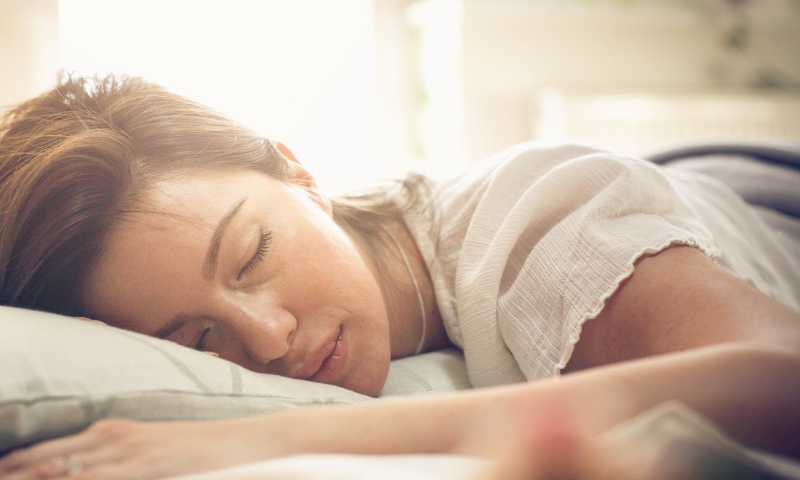By Becca Hovermale, LAPC, CSAT
We all know that lack of sleep can leave an adolescent – or any human being for that matter – irritable, but did you know that it can also negatively impact one’s memory retention and immune function? Lack of sleep can even be linked to some gastrointestinal disorders. It is estimated that 70% of people have a sleeping disorder in the United States alone. (The Sleep Doctor: Sleep Disorders). For the college population, 60% of students suffer from poor sleep quality, while 7.7% of these students meet the criteria for an insomnia disorder. (Natural Library of Medicine: Sleep Problems in University Students-An intervention).
The Effects of Sleep Deprivation
The list of negative side effects from one’s lack of sleep is quite exhaustive, and some may even surprise you. (At least, it surprised me.)
Productivity & Academic Achievement
Most everyone knows that more sleep allows for better productivity and concentration. Naturally, these things correlate to better academic achievement. Therefore, if you have a child or adolescent struggling in school, this may not be due to a lack of understanding, but rather a disrupted sleep-wake cycle. In fact, a lack of sleep can negatively impact a child’s behavior and may even worsen attention-deficit hyperactivity disorder or ADHD symptoms. (Teen Insomnia: Tips to Help Adolescent Sleep).
Memory Retention
Sleep has been found to improve both memory retention and recall by between 20 and 40%. (The Impact of Sleep on Learning and Memory). How does this happen? The different stages of sleep, known as non-rapid eye movement (non-REM) and rapid eye movement (REM), serve different, yet critical roles to the memory. The hippocampus is a part of the brain responsible for making new memories. During the final stage of non-REM sleep, memories are transported from the hippocampus to other more permanent storage sites in the brain. Then REM, the most active stage of sleep associated with dreams, plays a role in linking together related memories, which strengthens critical thinking and creative problem-solving skills. (Sleep on it: How Snoozing Strengthens Memories). This is why it is important to get a good night’s sleep before a test, but it is EQUALLY important to get a good night’s sleep after studying for better retention as well.
Emotional Health
REM sleep also helps you process emotional memories, which can help with emotional reactivity. Lack of sleep causes a reduced ability to cope with stressors and irritability, which can cause interpersonal conflict. Furthermore, exaggerated emotional reactions can cause greater consequences for teens who are adapting to new social relationships, more responsibility and independence (Teens and Sleep). Remember how prevalent sleep deprivation is for college students already noted above.
Mental Health
Good sleep habits not only support one’s emotional development, but also one’s mental health as well. In fact, sleep-deprived teens are more likely to report anxiety, depression, and suicidal thoughts and behaviors. Sleeping disorders, such as insomnia or sleep apnea, have been directly linked to symptoms of depression through many studies. One specific study conducted over the course of ten years examined patterns of death by suicide and concluded that lack of sleep was a contributing factor to many of these deaths. (Teen Insomnia: Tips to Help Adolescent Sleep). This might be the subject of a separate blog entirely! It is important to note that chronic sleep deprivation and depression are so closely linked that sleep specialists often struggle identifying which came first in their patients.
Physical Health
Ever wonder why the body needs more rest and sleep during an illness? During sleep, the immune system releases protective proteins called cytokines, which are associated with inflammation. This inflammatory response actually helps the body fight off infections and injuries. Lack of sleep can lead to a decrease in the production of cytokines, furthermore, reducing infection-fighting antibodies and cells, which can increase the likelihood of illness. (How Sleep Affects Immunity; Teen Insomnia: Tips to Help Adolescent Sleep).
Lack of sleep has also been linked to gastrointestinal diseases, such as inflammatory bowel disease, gastro-esophageal reflux, liver disorders and colorectal cancer. These diseases can contribute to abnormal sleep, but the lack of sleep can also add to the severity of the symptoms, making it very cyclical, much like depression and sleep deprivation. (Sleep, Immunity and Inflammation in Gastrointestinal Disorders).
People who lack sleep are more likely to develop obesity and diabetes, as well as hypertension. (Sleep Statistics 2023). High blood pressure, heart disease, and stroke are added to the health risks of sleep deprivation. (How Does Sleep Affect your Heart Health?)
What Can We Do to Create Better Sleep Habits?
Now that I have sounded the alarm on the many detrimental effects that lack of sleep can cause, you might be wondering what one can do about this. How do we create better sleep habits, especially for adolescents that require more sleep?
The Center for Disease Control and Prevention (CDC) recommends the following amount of sleep for specific age groups:
- Ages 6 to 12 years should get 9-12 hours of sleep per night
- Ages 13 to 18 years should get 8-10 hours per night
- Ages 18 to 64 years should get 7-9 hours per night
For the recommended amount of sleep for other ages not listed here, check out Sleep Statistics 2023.
Helpful Sleep Habits
There are a number of recommendations for optimal sleep.
- Sleep ROUTINE – Going to bed and waking at the same time (or near the same time) daily is important for our brains to thrive and keeping our circadian rhythms regulated.
- This means that your weekend schedule should also remain relatively consistent with your weekly schedule. (This can be especially important – and particularly difficult – for teens!)
- Avoid an afternoon nap that might keep you from going to bed at your usual time.
- For more information on circadian rhythms and the average teen circadian cycle, visit Circadian Rhythms.
- Have a sleep friendly environment – The bedroom should be comfortable, cool, quiet and dark.
- The bed should be reserved for sleeping only, and not doing work, lounging or watching TV.
- A bedroom warmer than 75 degrees can make it difficult to sleep.
- Avoid light and screen time before bed, which may be particularly challenging for teens. (Sleep Hygiene for Teens). This is recommended because the blue light emitted from electronic devices suppresses the body’s release of the sleep hormone, melatonin. (Teen Insomnia: Tips to Help Adolescent Sleep
- Additional Tips:
- Incorporating a daily exercise routine can help the body fall asleep sooner and sleep deeper.
- Going outside for daily sun exposure, especially in the mornings, helps the body keep its internal clock on track. Remember the significance of circadian rhythms!
- Avoid going to bed on an empty stomach, but also avoid eating a full meal an hour before bed; try light snacking instead.
- Avoid caffeine in the late afternoon or evening.
- Alcohol and smoking can also disrupt sleep.
- Avoid over-the-counter sleep aids, as these can be potentially dangerous and cause the body to depend on them. (Sleep Hygiene for Teens).
Want even more information?
Check out the following links for even more information about the impact of good (and bad) sleep.
- For a better understanding of the sleep cycles, such as Non-REM and REM, visit Sleep Basics.
- For more information on the various sleep disorders, visit Sleep Disorders.
- Visit Sleep Disorders in Adolescents for the most common sleep disorders affecting this population and their suggested treatments.
- To learn about the significance of sleep for women, visit Why Do Women Need More Sleep than Men?
- Check out Sleep Statistics 2023 for more interesting facts on sleep.

